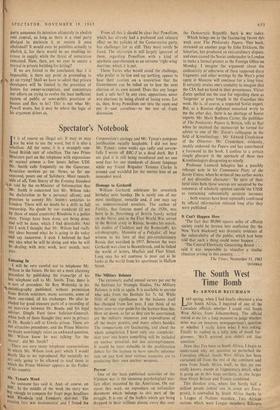Psywar One of the least publicised activities of the Vietnam
war is the immense psychological war- fare effort mounted by the. Americans. On our cover this week we reproduce .an unfamiliar document which ' belongs to this part of the struggle; It is one of the leaflets which are being dropped in their millions almost every day over Which brings me to the fascinating furore this week over The Penkovsky Papers. This book, reviewed on another page by John Erickson, the historian, has produced an extraordinary dispute, and even caused the Soviet ambassador in London to make a formal protest at the Foreign Office'on Monday. I imagine the argument about the authenticity or otherwise of these supposed diary fragments and other writings by the West's prize agent in Moscow will continue for a long time. It certainly strains one's credulity to imagine that the CIA had no hand in their provenance. Victor Zorza spelled out the case for regarding them as `forgeries' at great length in the Guardian this week. He is, of course, a respected Soviet expert. But, as a Russian diplomat remarked wryly to me the other day, there is no shortage of Soviet experts. Mr. Mark Bonham Carter, the publisher of The Penkovsky Papers in Britain, tells us fhat when he received the manuscript he turned fOr advice to one of Mr. Zorza's colleagues in the field of Kremlinology: Mr. Edward Crankshaw of the Observer. Mr. Crankshaw, evidently, readily endorsed the Papers and has contributed a foreword to the book. I confess to a certain simple pleasure in the spectacle of these two Kremlinologists disagreeing so utterly.
Professor Leonard Schapiro has a possibly relevant note in his Communist Party of the Soviet Union, when he writes of two earlier works of not dissimilar character: 'In spite• of their lurid titles both these sources are accepted by the consensus of scholarly opinion outside'the USSR as containing substantially accurate accounts . . . both sources have been repeatedly confirmed by official information released long after they were published . .


































 Previous page
Previous page